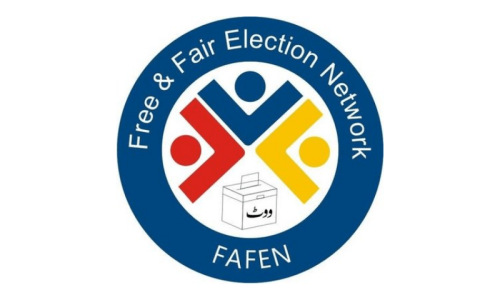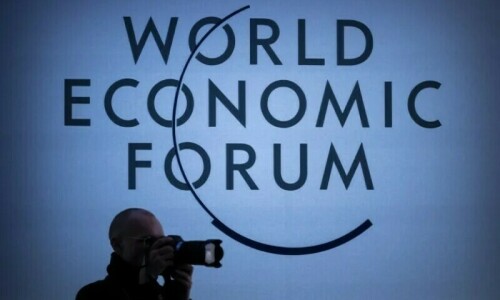KARACHI, April 27: Though the independence of the judiciary is important for establishing the rule of law in the country, the two issues that need immediate attention in Pakistan are rising oil prices and the food crisis, which have the potential to destabilise an already vulnerable economy.
This was stated by economic analyst Yousuf Nazar at the launch of his book The Gathering Storm in a local hotel on Sunday.
Mr Nazar, whose book is subtitled ‘Pakistan: political economy of a security state’, has a detailed background in international finance and has now turned to economic analysis. The book is a compendium of his articles.
“The judiciary is important but the two most potent crises we face are food and oil. The oil price may hit $200 a barrel in the next year,” he said, adding that the Pakistani economy was especially vulnerable due to high inflation, current account and fiscal deficits.
“It is a matter of great concern as a Pakistani. India and China are in a better position financially to cope with the crises. The challenge is there. Shall we grab the opportunity or let is pass?” he added.
Mr Nazar said that powerful global forces were shifting the centre of power from the west to the east, where oil producers were sitting on about $2 trillion.
He dedicated the book to the “74 per cent of Pakistanis who live on $2 or less a day. It is also dedicated to the elite for a reason. We stand at a point in history where we see things that might not be the same as the past. The party has come to an end.”
Citing oil as “the crux of the matter”, he recalled that it was the oil embargo enforced during the 1973 Arab-Israeli War that ended the longest period of economic growth in the world, which had started in the 1950s. He added that the current crisis was being fuelled by speculation.
“People think the collapse of the Soviet Union was the result of Jihad or Ronald Reagan’s policies. After 1980, oil prices collapsed, which precipitated the collapse of a centralised, corrupt, elitist economic system,” he said.
Federal Minister for Information and Broadcasting Sherry Rehman, who was the chief guest, said economics could not be divorced from politics. “Countries where the elite abstain from their responsibilities go nowhere. The elite must become stakeholders and meet the great unwashed,” she said.
Labelling the author’s “anti-establishment” views as “refreshing”, the minister said Mr Nazar had written during a period when the country’s elite were supporting a “failing economic and political system.” She claimed that the collapse of the BJP government in India in 2004, partially due to the backfiring of the ‘India shining’ slogan, should have come as a warning to Pakistan.
“The crisis is unprecedented. We are not saying the private sector should not be the driver of the economy, but given the widespread impoverishment, we cannot rely on traditional economic models,” Ms Rehman observed.
‘Mobiles and fancy cars’
She said certain ministers were staying awake at night discussing the bread-lines that were fast becoming common in the country. Lambasting the previous set-up, she said the present government had inherited a “moth-eaten country. Planning was short-sighted and top-heavy. There were no social, agricultural or energy policies. The last government had not invested in one megawatt of (energy production) over the last seven years. Mobile phones and fancy cars do not fuel a developing country’s economy.”
Earlier, several speakers praised the prescience of Mr Nazar’s work.
Salim Raza, CEO of the Pakistan Business Council, said economists had to rethink their paradigm in reference to food, fuel and market stability. He said the lack of awareness on the part of the world’s central banks and analysts regarding the current crisis was immense. “However, the effects of the economic depression will be moderated by the decoupling of growth, especially growth in European and emerging markets, alongside huge financial reserves in the Middle East and emerging markets” to the tune of $7 trillion, he added.
He said Mr Nazar’s work stimulated debate on important economic issues confronting Pakistan and that it was not doctrinaire or theoretical.
Muneer Kamal, CEO of KASB Bank, said Yousuf Nazar’s work was valuable as it discussed the “elitist structure of society and the economy,” adding that the nation’s economic ills were due to this structure.
He said in an atmosphere where we mostly have “after the fact analysis,” Mr Nazar’s views were welcome. He cited one of the author’s articles from August 2006 where he had written that oil would hit $100 a barrel, while in Jan 2007 he had discussed rising inflation.
Jawaid Bokhari, editor of Dawn’s weekly EBR section, noted that Mr Nazar, “unlike some technocrats, looks at the big picture. He looks at things critically and raises issues that have a strong bearing on Pakistan’s future.”
Quoting the author as saying that “Pakistan has a patronage-driven protectionist economy” no longer able to stand on its feet in the global economy, Mr Bokhari said we may yet see the full fury of the gathering storm. “Policy-makers stick to policies that are no longer relevant. They need to blend continuity and change.”
Jamshed Mirza, publisher of the book, also spoke.












































Dear visitor, the comments section is undergoing an overhaul and will return soon.